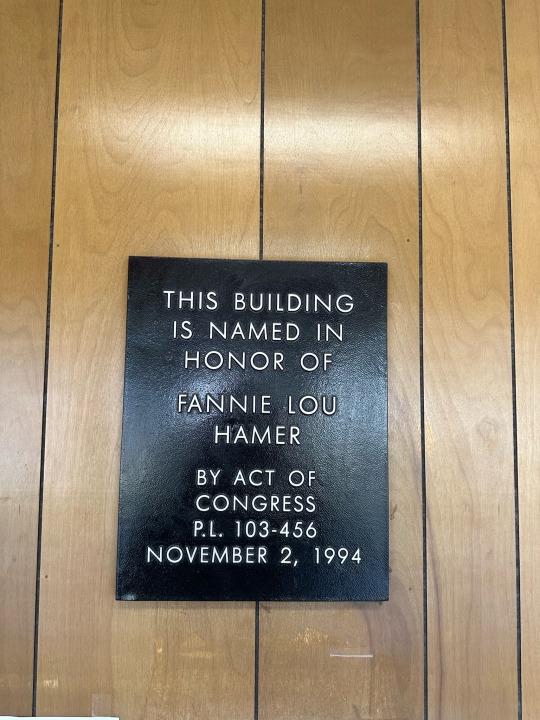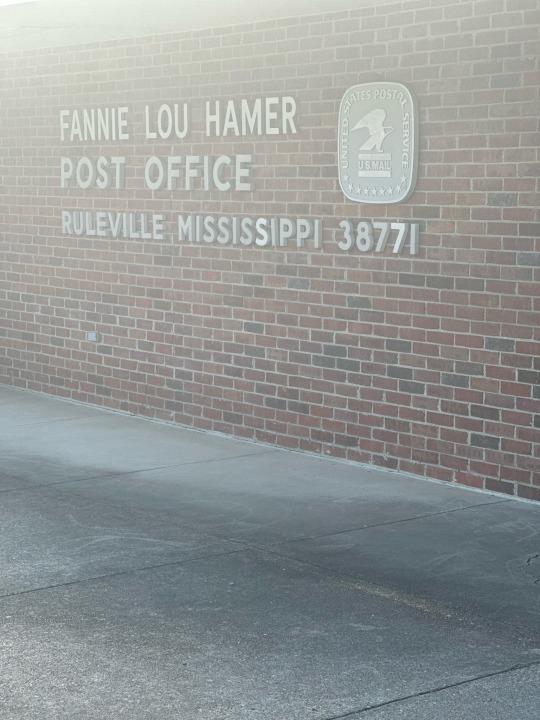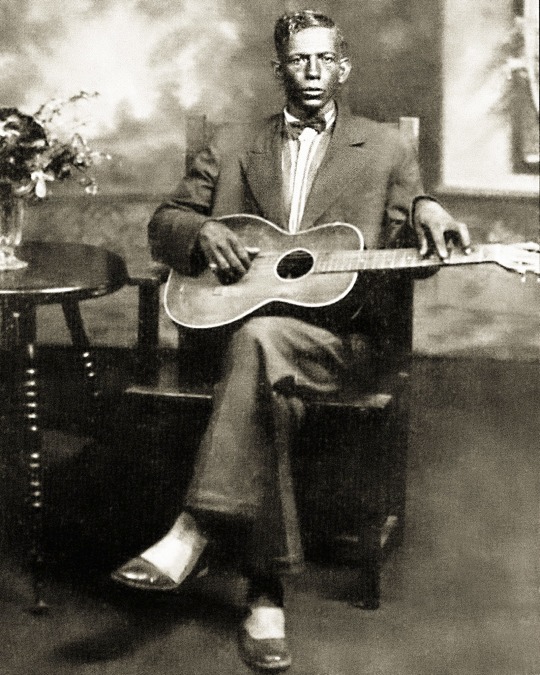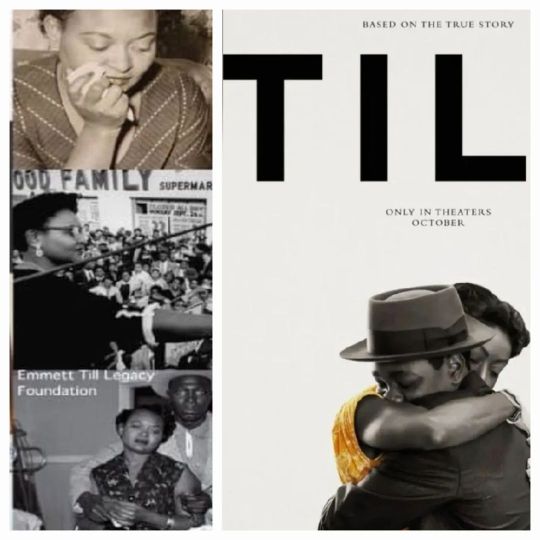#Ruleville
Explore tagged Tumblr posts
Text



#mississippi#fannie lou hamer#hometown hero#ruleville#mississippi delta#civilrightsmovement#civil rights#human rights#voting rights
14 notes
·
View notes
Text

Fannie Lou Hamer with husband Pap and friends, Ruleville, Mississippi. ©Bruce Davidson/Magnum 1970
new bones
we will wear
new bones again.
we will leave
these rainy days,
break out through
another mouth
into sun and honey time.
worlds buzz over us like bees,
we be splendid in new bones.
other people think they know
how long life is
how strong life is.
we know.
Lucille Clifton
14 notes
·
View notes
Text

Charley Patton was considered by many to be the "Father of the Delta Blues", he created an enduring body of American music and inspired most Delta blues musicians. He lived most of his life in the Mississippi Delta and in 1897 his family moved to the Dockery Plantation, a cotton farm and sawmill near Ruleville, Mississippi. It was there that he developed his musical style, influenced by Henry Sloan, who had a new, unusual style of playing music, which is now considered an early form of the blues.
Charley performed at Dockery and nearby plantations and began an association with Willie Brown. Tommy Johnson, Fiddlin' Joe Martin, Robert Johnson, and Chester Burnett (who went on to gain fame in Chicago as Howlin' Wolf) also lived and performed in the area, and Patton served as a mentor to these younger performers. Patton was a "jack-of all-trades bluesman", who played "deep blues, white hillbilly songs, nineteenth-century ballads, and other varieties of black and white country dance music.
He was popular across the southern United States and performed annually in Chicago. Unlike most blues musicians of his time he played scheduled engagements at plantations and taverns. He gained popularity for his showmanship, sometimes playing with the guitar down on his knees, behind his head, or behind his back. Patton was a small man, about 5 feet 5 inches tall but his gravelly voice was reputed to have been loud enough to carry 500 yards without amplification; a singing style which particularly influenced Howlin' Wolf. In May, 2021, the Rock and Roll Hall of Fame posthumously inducted Patton into the 2021 class as an Early Influence.
Born Charlie Patton c. April 1891 in Hinds County, Mississippi and died on April 28, 1934 at the Heathman Plantation, Sunflower County, Mississippi at the age of 43.
#charley patton#love#howlin wolf#mississippi#delta#blues#cotton#musician#guitars#music legend#rock and roll hall of fame#country blues#gospel
12 notes
·
View notes
Text

ruleville, mississippi
5 notes
·
View notes
Text

Lusia Mae Harris Stewart (February 10, 1955 – January 18, 2022) was a basketball player. She is considered to be one of the pioneers of women’s basketball. She played for Delta State University and won three consecutive Association for Intercollegiate Athletics for Women’s National Championships. On the international level, she represented the US national team and won the silver medal in the 1976 Olympic Games, the first women’s basketball tournament in the Olympic Games. She played professional basketball with the Houston Angels of the Women’s Professional Basketball League and was the first and only woman ever, to be officially drafted by the NBA. She was inducted into the Naismith Memorial Basketball Hall of Fame and Women’s Basketball Hall of Fame.
She was born in Minter City, Mississippi to Ethel Harris and Willie Harris, a sharecropper in the cotton fields. She was the fourth of five daughters and the tenth of eleven children, all of whom attended Amanda Elzy High School near Greenwood, Mississippi. All of her brothers and one of her older sisters played basketball.
She won the MVP award three years in a row, served as team captain, and made the state All-Star team. She scored a school record 46 points in one game and led her school to the state tournament in Jackson, Mississippi.
She attended school on a combination of academic scholarships and work-study funds since this was before Title IX.
She graduated from Delta State University with a BS in Health, Physical Education, and Recreation. She worked for Delta State as an admissions counselor and assistant basketball coach. She earned an MA in Education from Delta State. She served as the head coach at Texas Southern University. She returned to her native Mississippi where she worked as a high school teacher and coach at her alma mater Amanda Elzy High School, at the Greenville Public School District, and Ruleville Central High School.
She married George E. Stewart (1977). They had four children, two sons and twin daughters. She was a member of Delta Sigma Theta. #africanhistory365 #africanexcellence #deltasigmatheta
0 notes
Text
Allen Mane
“To be great you can’t give up” Charles “Allen Mane” Allen Jr is a Soul and Blues Artist from Shelby, MS. Coming from a musically rooted family, The Boone’s of Shelby/Drew/Ruleville Mississippi area, music was almost like a calling. A true trombonist but plays a variety of instruments fluently. Was known as Sixx3 Mr BiggHead in the Mississippi Underground Hip Hop scene from 1997 to 2020. In Mid…

View On WordPress
0 notes
Text
On June 9, 1963, Fannie Lou Hamer and other civil rights activists were arrested in Winona, Mississippi, while returning from a voter education workshop in South Carolina. Mrs. Hamer and the other activists had been traveling in the "white" section of a Greyhound bus despite threats from the driver that he planned to notify local police at the next stop. When the bus arrived at the Winona bus depot, some of the activists attempted to eat at Staley's Cafe but were refused service.
Mrs. Hamer, who had stayed on the bus, soon saw police officers arresting some of the activists. She got off the bus and was seized by a white police officer who began kicking her and arrested her. In August 1964, while testifying at the Democratic National Convention to urge party bosses to seat a group of Black Mississippi voters as delegates, Mrs. Hamer recalled the abuse she endured that night at the county jail.
"It wasn't too long before three white men came to my cell," she said. "One of these men was a state highway patrolman and he asked me where I was from. I told him Ruleville and he said, 'We are going to check this.' They left my cell and it wasn't too long before they came back. He said, 'You are from Ruleville all right,' and he used a curse word. And he said, 'We are going to make you wish you was dead.'"
The white officers then forced two African American prisoners to brutally beat Mrs. Hamer with loaded blackjacks; she was nearly killed. As Mrs. Hamer regained consciousness, she overheard one of the white officers propose, "We could put them SOBs in [the] Big Black [River] and nobody would ever find them."
Mrs. Hamer suffered from life-long injuries following the attack, including permanent kidney damage. Mrs. Hamer died in 1977 at age 59. Lawyers with the Student Nonviolent Coordinating Committee (SNCC) filed suit against the Winona police who brutalized the activists, but an all-white jury acquitted them. Despite the trauma she experienced, Mrs. Hamer returned to Mississippi to continue organizing and remained active in civil rights causes until her death.
#history#white history#us history#Fannie Lou Hamer#June 9 1963#June 9#civil rights#Black history#Winona#Mississippi#voting rights#vote#Greyhound bus#bus driver#racist#racism#white supremacy#white section#segregated#segregation#racial segregation#police#police officer#law enforcement officer#law enforcement#police brutality#police cowardice#defund the police#bad police#dirty cops
0 notes
Text
Hers an essay my teacher had me write a puniscausr I was two minutes late to class when I had crutches
Fannie Lou Hamer
—-------------------------------------------------------------------------------------------------------------------------
Fannie Lou Hamer was a black civil rights activist who helped the
African American community to raise money and vote.
Hamer was the last of 20 children to Ella Townsend and James Lee Townsend.
At a the age of six hamer had contracted polio which affected
her, but she still had to work and picked from about 200-300lb of cotton daily in order to help and give it to her parents' sharecropping partner.
At the age of 12, during her seventh year, Hamer stopped going to school to continue helping her parents with work. As Hamer grew, she married perry Hamer in 1944;
Since Harmer was able to read and write, she had the job as plantation timekeeper
(a high job like manager) .n.D Marlow until 1962.
During her time working at the plantation, Hamer had to get a minor surgery for the removal of her uterine tumor, but during that surgery a white doctor had tied Hamer tubes in a process called a Hysterectomy. . This surgery was done without the consent of Hamer, and sadly was a common thing that was known as Mississippi Appendectomy. ;it was used by white doctors to try to deplete or lessen the African American community.
After the surgery was done, Hamer and Perry did try to have their own children but had several miscarriages, so they adopted two girls whose parents couldn’t raise them and later on adopted the older daughters children when she died. Her appendectomy was the beginning of her motivation to join the civil rights movement.
On August 31, 1962, Hamer and 17 of her neighbors boarded a yellow bus to place their cards in the ballad. But there were outrageous tests and officials stopping them from trying to vote, in the end only hamer and one other man
were the only two who could fill out the application given to them and take the literacy test in which they both failed.
On the way back to Ruleville, the bus was stopped by a police officer and fined for being too yellow. The bus driver as a result was arrested, but during this Hamer started singing “This little light of mine” and “Go tell it to the mountain”; she is known for singing these songs later on when she becomes an activist.
After all the passengers collected enough money to pay the fine, the bus was returned, but when Hamer returned home hamers employer B.D already knew she tried to vote so when she got home he ordered her off his land.He kept her husband because he needed him to finish the picking season.Harmer stayed with friends but her and her husband knew they couldn't stay because it wasn't safe in Ruleville any longer for them so they took their daughters and left.
After Harmer left the news of her singing on the bus spread
And the leaders at the local organization and SNCC field secretary Bob Moses.
They believed her willingness to oppose the county register is what would make her a great potential leader. So he sent a young activist to find her,
He was Charles MC Laurin .
During the year after Hamer got kicked out of her home she continued to fight for voter registration and desegregation she also donated food clothing and blankets to african american families in need
Fisk University (FU) in Nashville in the fall of 1962;Harmer had her first conference at FU.Every thing Harmer said stuck with people becoming a success and she was appointed the role as a community organizer in Nashville.
On 06/09/1963 several activists including Hamer were returning home on a bus after a citizenship training program, in response they went to a cafe and sat at an all’white’ counter. Soon after the police came and “arrested’’ them, but when they took them in they beat harped and the others mercilessly.
After the officers had beaten hamer and the other they forced black inmates to beat them as well as forcing another inmate to beat them with their blackjack weapons,leaving Hamer with injuries on her eyes, kidneys and legs that stayed with her till death.
When Hamer and the others got out during the months that followed, Hamer continued to increase her public profile.Over time as hamers public voice grew She ran against Jamie Whitten , a veteran congressman ,for congress’s MFPD candidate in the democratic primary.Hamer lost but it still was a turning point for the african american community because because it gave the MFPD a chance to have a national presence.
Hamer traveled to train volunteers, sing the spiritual songs she was known for and give powerful speeches.There were many black volunteers and some white volunteers but the MFPD was weary of the white’s,it was during this time when Hamer stood up and tried to convince and tell the people in MFPD''If were trying to break down this barrier of segregation, we can’t segregate ourselves''. ”
Aug 22,1964 Harmer went with other members of MFPD and argued against the way they were being treated during the Democratic National Convention.
President Lyndon Johnson at this time set up a televised press conference to block and not give any airtime to Hamer and the others,but when he didn't expect was several stations to broadcast a recording of her powerful speech about african american injustices later that night,having more people see it and pretty soon Harmers speech was almost famous.
Hamer helped organize Freedom Summer, an organization to help African Americans voter registration in the south and declared her candidacy for Mississippi House of Representatives but was denied the ballade . A year later Victoria Gray, Harmer, and Annie Devine were the first African American women to stand in the U.S Congress.
Hamer tired and frustrated with the slow progress they made politicly she decided to start a “Pig Bank ” ( where you give african american farmers pigs to breed feed then slaughter); she also started Freedom Farm Cooperative so african americans can own and farm their own land, cause of this with help from donors Hamer bought up to 640 ankers and filled them with different businesses like a boutique, coop store, a sewing enterprise, and 200 units of low income housing were made, this lasted till the 1970’s
Sadly seven years later on March 14, 1977 Hamer passed away due to breast cancer when she was 59, Leaving behind a legacy of helping the women & men of the african american community.
Mr.J can suck it
0 notes
Photo

Photo: Delacroix-Like Dance
Photographer caption: A group of cowboys takes to the dance floor at Club Black Castle in Ruleville, Mississippi.
Photo by Rory Doyle (Cleveland, Mississippi); Ruleville, Mississippi
Our 16th annual photo contest is now closed. We will announce finalists and winners in the spring! Please enjoy our archives in the meantime.
#Smithsonian#Smithsonian Magazine#smithsonian.com#dance#cowboys#dance floor#Club Black Castle#Ruleville#Mississippi#documentary#american experience#united states#the South#dance club#club#photo contest#photography#Photo of the Day
135 notes
·
View notes
Photo

Just saw @tillmovie which was very WELL DONE. No it wasn't easy to watch but as Mamie Till told the world: We have to. @danielledeadwyler had PHENOMENAL moments that are still with me. She did THE WORK to honor this truly unsung Sheroe. The director Chinonye Chukwu who directed @clemencythefilm crafted a heartful cinematic journey to show us the personal impact this event had on the family and community at large. (Please watch #womenofthemovement on #appletv too!) Shout out to @whoopigoldberg @keithbeauchamp for FINALLY getting this story to the big screen! 👏🏾👏🏾 Now let's get #carolynbryant prosecuted!! @emmetttilllegacyfoundationcontinues to fight for justice and offers support to the mothers who have lost their children by #moderndaylynching which was only made illegal in MARCH 2022 with the much belated #antilynchingact put in place to protect #theblackbody !! 67 YEARS LATER!! On a personal note my family lived in this same area. My Uncle Kenny was good friends with #medgarevers and lived around the corner from #amziemoore The @amziemoorehouse still stands today and is open to visitors. It was a meeting place for #civilrights folk. #fannielouhamer was from nearby #ruleville Mississippi and probably knew my Aunt Ree and uncle too. This is the south my father left. Another part of the #babygirlplay story that will be further explored in #babygirltvshow Legacy and History I am a part of which makes this story extra personal to me. #tillmovie #emmetttill #mamietill #Mississippi #amziemoore #medgarevers #myfamily connection https://www.instagram.com/p/CkddvIFOfIA/?igshid=NGJjMDIxMWI=
#womenofthemovement#appletv#carolynbryant#moderndaylynching#antilynchingact#theblackbody#medgarevers#amziemoore#civilrights#fannielouhamer#ruleville#babygirlplay#babygirltvshow#tillmovie#emmetttill#mamietill#mississippi#myfamily
0 notes
Text

To the left side of the picture is her actual grave. To the left of her grave is husband’s grave (not pictured). To the right is a statue of her.
#trieyemedia#mississippi#fannie lou hamer#ruleville#civilrightsmovement#human rights#canon eos m50#street photography#statue
4 notes
·
View notes
Text
WILLIAM STEWART CARROTHERS - CLAN CARRUTHERS CCIS
WILLIAM STEWART CARROTHERS – CLAN CARRUTHERS CCIS
WILLIAM “BILLY” STEWART CARROTHERS William (Billy) Stewart Carrothers Jr., United States Air Force Retired Fighter Pilot, and beloved father, died on August 20, 2021, of natural causes at his home in Smithville, Mississippi. The family will announce details of his funeral service later. Billy was born in Greenville, Mississippi at King’s Daughters’ hospital on April 4, 1933, to William and…

View On WordPress
#Carrothers#fighter pilot#Hazel Lee#MISSISSIPPI#rotc#Ruleville Ms#stewart#USAF#veterAN#vietnam#WILLIAM
0 notes
Text

ruleville, mississippi (source)
1 note
·
View note
Photo

Steve Schapiro Civil Rights Activist and Organizer of the Freedom Summer Organizer Fannie Lou Hamer, Ruleville in Her Home, Mississippi 1963
“I am sick and tired of being sick and tired.” Fannie Lou Hamer
76 notes
·
View notes
Text
VOTE OR DIE
by Margaret Block
(A Poem Commemorating the Voting Rights Act of 1865-1965)
Vote or die will always be my battle cry.
I cry for the slaves who are long ago gone
It wasn't for the vote but t'was freedom they longed
And they cried and sang this sad song.
Woke up this morning with my
Mind stayed on freedom
Woke up this morning with my
Mind stayed on freedom
Hallelue, Hallelue, Hallelujah
Vote or die.
Vote or die was Mary Ann Cary's battle cry
She was an attorney in D.C.
The year was 1880
She fought for the woman's right to vote
She asked Hiram Revels if you can vote, then why can't I?
Vote or die was always Mary Ann's battle cry.
Vote or die.
Vote or die was Aaron Henry's battle cry
He got in the battle early on.
He was a pharmacist and Clarksdale, Mississippi was his home,
They put him in jail and beat him up
And made him ride on the back of a garbage truck.
They tried to take away his dignity and
He told them that when he got the vote,
We will all be free.
Vote or die!
Vote or die was Malcolm X's battle cry
He asked LBJ in no uncertain way which will it be
The ballot or the bullet.
Vote or die!
Vote or die was Hartmon Turnbow's battle cry
He lived in Mississippi town in Holmes county
They put bullet holes through his front door
And they set his house on fire because
He said that he was going to vote in the fall
Because freedom was his desire.
Vote or die!
Vote or die was Diann Nash's battle cry
She fought for rights in Nashville, Tennessee.
She went to jail all over the land
She took a lot of young people by the hand
And said if you vote, it'll set us free.
Vote or die!
Vote or die was Rev. J. D. Story's battle cry.
In 1962 he took a very brave stand
And he let the world know that he wasn't a coward
But a god-fearing man
He said that "the doors of the church is (sic) open"
And he showed no fear because
The vote to him was crucial and dear.
Vote or die!
Vote or die was Larry Rubin's battle cry.
He came to Mississippi because he had a dream
But they locked him up in Holly Springs.
When he went to court he took a stand
And told the Judge, if you can vote, then why not every man.
Vote or die!
Vote or die was Sam Block's battle cry
When he went to Greenwood they beat him up and threw him in jail.
They told his attorney there would be no bail
He stayed in jail and stood his ground
And he turned Greenwood upside down.
Vote or die!
Vote or die was Jimmy Travis' battle cry.
While in Greenwood he got shot in the head
The Klan thought that he was dead.
They were surprised he survived and when he awoke
He said in a voice very loud
My head is bloodied but unbowed
Vote or die!
Vote or die was Arnell Ponder's battle cry
They almost killed her in the Winona jail
She told Euvester to hold her head high
Because when they got out
She would vote or die.
Vote or die was Mrs. Fannie Lou Hamer's battle cry
They did her a favor when she got kicked off the land
She went to Ruleville and took her stand.
She told the world with force and pride
That she was sick and tired of being sick and tired
They beat her up in the Winona jail
When she got out she was strong but kind
And she would always sing this little light of mine.
This little light of mine
I'm gonna let it shine
This little light of mine
I'm gonna let it shine, let it shine, let it shine, let it shine.
Vote or die!
3 notes
·
View notes
